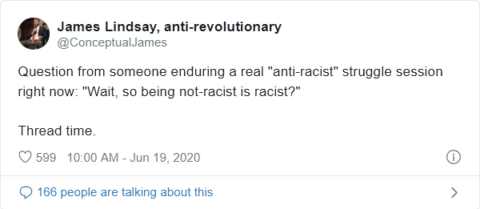In City Journal, Christopher Rufo explains why Critical Race Theory is a natural child of orthodox Marxist thought:
Critical race theory is an academic discipline, formulated in the 1990s and built on the intellectual framework of identity-based Marxism. Relegated for many years to universities and obscure academic journals, it has increasingly become the default ideology in our public institutions over the past decade. It has been injected into government agencies, public school systems, teacher training programs, and corporate human-resources departments, in the form of diversity-training programs, human-resources modules, public-policy frameworks, and school curricula.
Its supporters deploy a series of euphemisms to describe critical race theory, including “equity,” “social justice,” “diversity and inclusion,” and “culturally responsive teaching.” Critical race theorists, masters of language construction, realize that “neo-Marxism” would be a hard sell. Equity, on the other hand, sounds non-threatening and is easily confused with the American principle of equality. But the distinction is vast and important. Indeed, critical race theorists explicitly reject equality — the principle proclaimed in the Declaration of Independence, defended in the Civil War, and codified into law with the Fourteenth and Fifteenth Amendments, the Civil Rights Act of 1964, and the Voting Rights Act of 1965. To them, equality represents “mere nondiscrimination” and provides “camouflage” for white supremacy, patriarchy, and oppression.
In contrast to equality, equity as defined and promoted by critical race theorists is little more than reformulated Marxism. In the name of equity, UCLA law professor and critical race theorist Cheryl Harris has proposed suspending private property rights, seizing land and wealth, and redistributing them along racial lines. Critical race guru Ibram X. Kendi, who directs the Center for Antiracist Research at Boston University, has proposed the creation of a federal Department of Antiracism. This department would be independent of (i.e., unaccountable to) the elected branches of government, and would have the power to nullify, veto, or abolish any law at any level of government and curtail the speech of political leaders and others deemed insufficiently “antiracist.”
One practical result of the creation of such a department would be the overthrow of capitalism, since, according to Kendi, “In order to truly be antiracist, you also have to truly be anti-capitalist.” In other words, identity is the means; Marxism is the end.
An equity-based form of government would mean the end not only of private property but also of individual rights, equality under the law, federalism, and freedom of speech. These would be replaced by race-based redistribution of wealth, group-based rights, active discrimination, and omnipotent bureaucratic authority. Historically, the accusation of “anti-Americanism” has been overused. But in this case, it’s not a matter of interpretation: critical race theory prescribes a revolutionary program that would overturn the principles of the Declaration and destroy the remaining structure of the Constitution.




